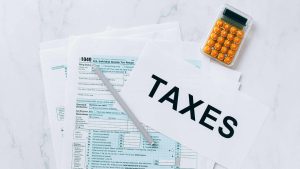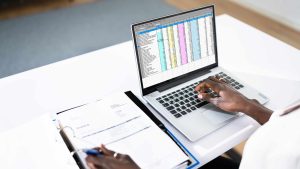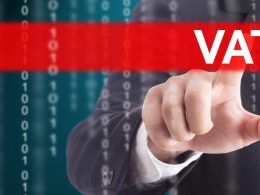Are you a sole trader looking for guidance on navigating the complexities of tax obligations? Look no further! Welcome to our complete guide on sole trader tax. As a self-employed individual, understanding your tax responsibilities is crucial to ensure compliance and avoid penalties. In this article, we will walk you through everything you need to know about being a sole trader regarding taxes. From registering as a sole trader, filling out tax returns to allowable expenses, and dealing with HMRC investigations, we’ve got you covered. So, let’s dive in and demystify the world of sole trader taxation!
Registering As a Sole Trader Tax

Registering as a sole trader is the first step to becoming self-employed. It’s a straightforward process that involves informing HM Revenue and Customs (HMRC) about your new business venture. You’ll need to provide details such as your personal information, business name, nature of your business, and expected income. Registering ensures you meet legal obligations and allows you to file tax returns correctly and on time. Stay tuned for more insights on sole trader taxes!
Advantages and Disadvantages of Being a Sole Trader
- The advantages of being a sole trader include complete control over business decisions, flexible working hours, and keeping all profits.
- On the downside, you are personally liable for any debts or legal issues your business may face.
Deadlines and Penalties for Tax Return Submission
Filing your tax return on time is crucial, as there are penalties for late submission. The deadline for online submissions is usually 31 January, while paper returns have an earlier deadline of 31 October. Late filing can result in fines ranging from £100 to even more, depending on the delay. Staying organised and submitting your tax return promptly is essential to avoid unnecessary penalties.
Filling Out a Tax Return and Paying Taxes

Filling out a tax return and paying taxes is a crucial responsibility for sole traders. You must report your income, claim any allowable expenses, and calculate your tax liability accurately. Ensure you have all the necessary documents and records organized before completing the form. Paying taxes on time is vital to avoid penalties or interest charges from HMRC. Stay on top of your financial obligations as a sole trader!
Allowable Expenses for Sole Traders
As a sole trader, you can deduct certain expenses from your taxable income, reducing your overall tax liability. Allowable expenses include business-related costs such as office supplies, travel, and marketing. It’s important to keep detailed records and receipts to support these deductions. By claiming allowable expenses, you can maximize your tax savings and ensure you only pay taxes on your income.
Dealing with HMRC Investigations
Dealing with HMRC Investigations can be daunting for sole traders. It’s important to keep accurate records and be prepared for any inquiries from the tax authorities. Cooperating fully and promptly to provide all requested information if you are under investigation is crucial. Seeking professional advice can also help navigate the process and ensure compliance with tax regulations. Stay proactive and transparent to avoid penalties or fines.
Benefits of Using Tax Software for Sole Traders

Tax software can be a game-changer for sole traders. It simplifies completing tax returns, saving time and reducing errors. With built-in calculations, it ensures accuracy and helps maximize deductions. Additionally, it provides reminders for important deadlines and keeps all financial records organized in one place. Using tax software streamlines the entire tax filing process for sole traders, making it more efficient and stress-free.
Record-Keeping for Sole Traders
As a sole trader, keeping accurate records is crucial for managing your finances and meeting tax obligations. Maintain organized records of income, expenses, invoices, receipts, and bank statements. This will help you calculate profits accurately and claim all eligible deductions. Good record-keeping also simplifies the process of completing your annual tax return. Stay on top of your financial documentation to stay compliant with HMRC requirements.
VAT Registration for Sole Traders
As a sole trader, you may need to register for VAT if your annual turnover exceeds the threshold set by HMRC. Registering for VAT means you have to charge VAT on your goods or services and submit regular VAT returns. It’s important to understand the rules and requirements of VAT number registration to ensure compliance with HMRC regulations.
National Insurance for Sole Traders
Understanding your obligations and the different classes of National Insurance contributions that may apply to you. These contributions go towards your state pension, healthcare, and other benefits. Ensure you know the rates and deadlines associated with National Insurance payments as a sole trader.
Assistance with Tax Affairs for Sole Traders

As a sole trader, managing your tax affairs can be overwhelming. That’s where professional assistance comes in. Hiring a tax advisor or accountant specialising in working with sole traders can help ensure you comply with all the necessary regulations and claim all the deductions you’re entitled to. They can also assist you with preparing and submitting your annual tax return accurately and on time, giving you peace of mind knowing that an expert is taking care of your tax obligations.
Conclusion
Being a sole trader comes with advantages and disadvantages, but understanding the ins and outs of sole trader tax is essential for running a successful business. Registering as a sole trader gives you flexibility and control over your business affairs. However, it’s important to remember the deadlines and penalties associated with tax return submission.
Filling out a tax return can be daunting for many sole traders, but the process becomes much simpler with proper record-keeping and tax software. Understanding allowable expenses that can help reduce your taxable income is also crucial.
Dealing with HMRC investigations may occur during your journey as a sole trader. Staying organized and keeping accurate records will greatly assist you if faced with an inquiry from HMRC.
VAT registration may become necessary depending on your annual turnover. Understanding when to register for VAT is vital to avoid penalties or fines.
In conclusion, navigating through sole trader tax obligations may initially seem complex. However, knowing about registering and submitting returns on time while paying attention to allowable expenses and record-keeping practices will make managing your taxes much easier.









